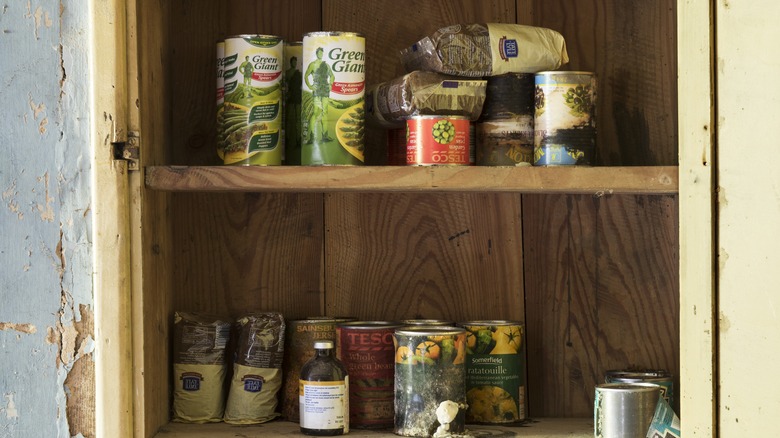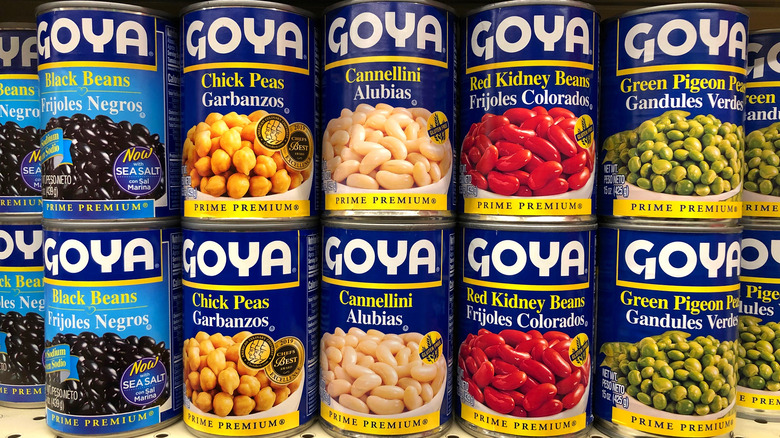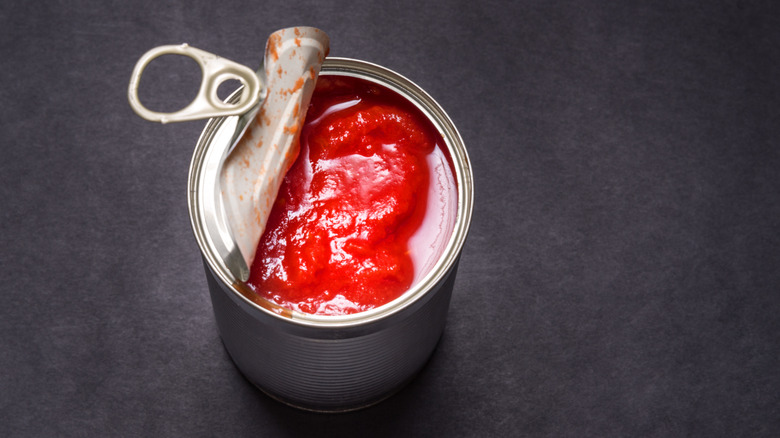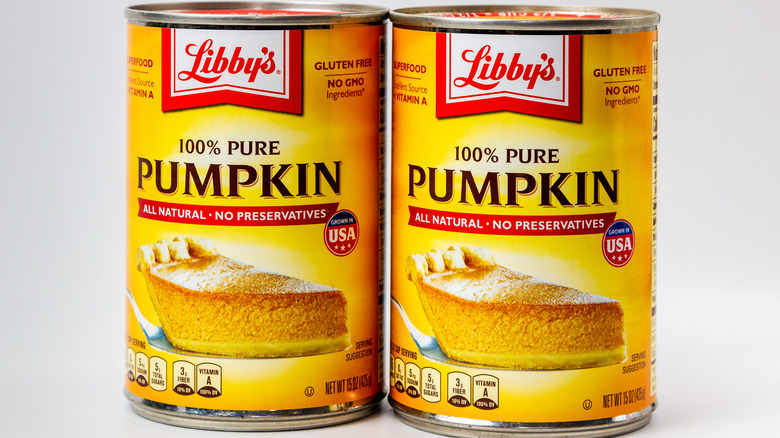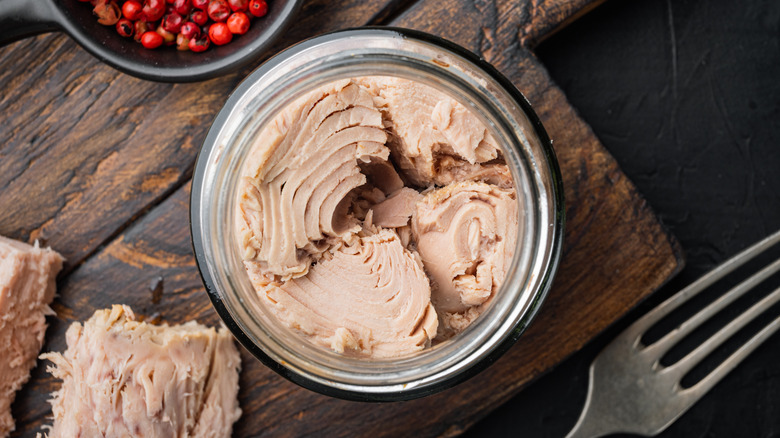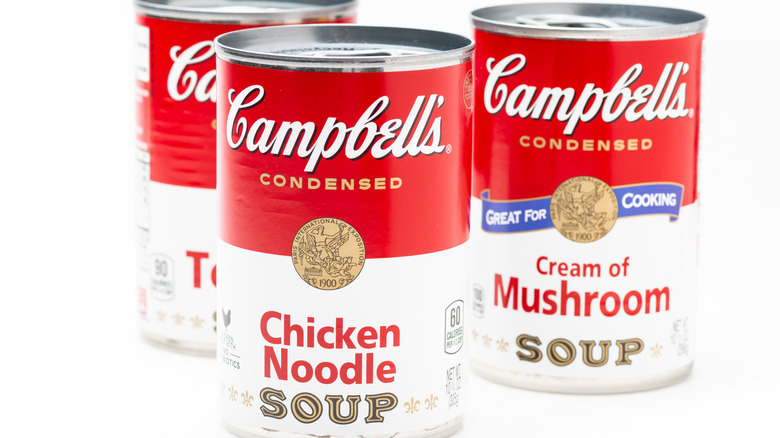Canned Foods You Should Have In Your Pantry At All Times
Canned foods are seriously underrated. There's a perception among certain types of foodies that canned foods represent the antithesis of everything food ought to be. Anything that comes out of a can is obviously not fresh-picked or fresh-caught, and it's likely that the can's contents weren't locally sourced, either. Canned foods also tend to require a lot less preparation than do fresh foods, and there seems to be a feeling in certain circles that food prep has to be difficult in order for the final product to be worth eating.
That's all well and good if you have the leisure time to shop at the market every day and then spend hours preparing gourmet meals –- even better if you have servants to do all of this work for you. It also helps if you live in a magical land where all of the earth's bounty is available throughout the year. If, however, you reside on planet Earth and are living the lifestyle of the not-so-rich-nor-famous, then there are guaranteed to be times when convenience trumps perfection. What's more, as anyone living in a natural disaster-prone area knows full well, there's nothing wrong with having a pantry full of shelf-stable foods for those times when nature presents a disaster (or you just get happen to hungry after the grocery store's closed for the night).
Canned beans are so easy to cook
You know what they say about beans -– they are, in fact, heart-healthy. A 2013 study published in the American Heart Association journal Circulation shows evidence that consuming beans can help to reduce coronary heart disease, so that rude rhyme you learned in elementary school was based on some pretty sound science. Medical News Today says beans may also possibly help prevent both cancer and diabetes, and these lovely legumes are also full of amino acids, vitamins, minerals, and fiber. (Fiber's the part producing the malodorous side effect.) What's more, beans are an inexpensive, tasty source of plant-based protein.
The problem with cooking beans comes when you use the dried kind. Sure, they're cheaper than canned, but they're also a real pain. This starts with the packaging, which carries an ominous warning that you have to sort through every last bean in search of whatever unwanted add-ins are permitted in the bean-packing industry. Once you've completed this chore, you'll need to soak the beans before cooking them for hours on end in order to render them edible. Do you really want to go through all this effort to save maybe 50 cents? Maybe if you have an Instant Pot and are looking for an excuse to use it, but if not, just buy canned beans — you'll be glad you did. Plus, you'll get an added bonus in the form of the liquid, which is great for baking!
Canned tomatoes make a better marinara
This may shock you, but no less a food authority than Bon Appétit magazine admits that, for everything other than salads and BLTs, canned tomatoes are actually superior to fresh. When it comes to cooking with tomatoes, canned ones are not only easier to work with, but they're also more flavorful and, believe it or not, more nutritious than their fresh counterparts. How can this be? Dietitian Chelsea Amer says that fresh tomatoes really aren't all that fresh since they may sit a while when in transit and then sit some more in the produce bin, all the while losing nutrients as they age. Canned tomatoes go almost directly from vine to can and the canning process locks in all of their goodness. Canned tomatoes are higher in lycopene, too, since this nutrient is more readily absorbed by the body after cooking, and canned tomatoes are partially cooked.
If you're concerned about the possible presence of harmful BPA in canned tomatoes, or in any canned goods for that matter, don't be. Nutritionist Robin Miller says that the dangers of BPA may have been greatly exaggerated (yet another case of "massive doses of such-and-such-substance given to mice won't really do them much good"), but at this point that's basically irrelevant, anyway. If the canned tomatoes you purchase were made in the U.S.A., their packaging material is BPA-free by law.
Canned pumpkin is the preferred product for pies
If you want to bake the very best apple pie, you wouldn't dream of using canned apples, nor could you make a truly delicious lemon meringue pie with bottled lemon juice. It just stand to reason, then, that the very best pumpkin pie would start with a fresh pumpkin, right? Maybe not. While pumpkin puree can be delicious in soups and pumpkin flesh can be chopped up into chunks to make hearty fall stews, if you're baking with pumpkin it's usually best to use the canned kind. Fresh pumpkin puree is often way too watery. While you can always strain it to reduce the moisture, the fact is, most recipes that call for canned pumpkin were written with that particular product in mind. What's more, Taste of Home says that pie filling made with canned pumpkin has a smoother texture and a stronger pumpkin flavor than filling that uses fresh pumpkin.
If you have pets, there's one more reason why you might want to keep a can of pumpkin on hand at all times. When dogs and cats experience those digestive upsets that occur from time to time, Wisconsin Pet Care says a few teaspoons of canned pumpkin stirred into their food can help to combat either constipation or diarrhea.
Canned tuna comes in handy under any circumstances
If there's anyone who knows a thing or two about canned goods, that person would have to be a doomsday prepper. Why is tuna so popular with preppers? Survival Sullivan explains that canned tuna is a shelf-stable meat product that is low in fat, not too high in sodium, and packs quite a protein punch. Even if you're not expecting the imminent arrival of the End Times and/or a ravenous zombie hoard, tuna is still a great thing to have on hand. It's often relatively cheap, and it makes for a nutritious meal in a hurry.
If you're not afraid of mayo, you can always make tuna salad. (Super budget tip: try tossing in a handful of uncooked oatmeal to stretch the salad even further and give it a nutrition boost.) If you prefer to keep the calories down, serve your tuna sans mayo atop a bed of lettuce. Tuna can even go super-sophisticated as part of a Nicoise salad.
Soup can be comfort in a can
Remember the times when you were sick as a kid and Grandma made you up a big batch of her famous chicken soup? No? If you're like many of us, your granny was too busy in the boardroom, the classroom, or high atop a pole repairing telephone lines to spare the time to make homemade soup. In fact, we wouldn't be surprised to hear that the vast majority of "old family recipes" for healing chicken soup begin (and end) with a can opener. Nothing wrong with that.
Sure, canned soup gets a bad rap for being high in sodium, but even mainstream brands like Campbell's have put in some effort toward lowering the amount of sodium in their product in recent years and there are plenty of healthier canned soups available on the market. If you're really concerned about sodium intake, you can even look for cans specifically labeled "low sodium" or just do as the "Today" show suggests and check the label. Sure, maybe homemade soup might be better for you when you're sick, but if you should happen to fall ill at a time when your domestic staff has the day off and Grandma's in Las Vegas, it's best to be prepared by having plenty of canned soup on hand.
